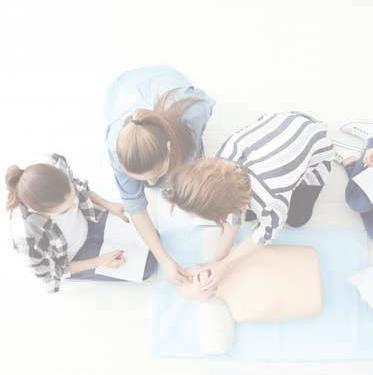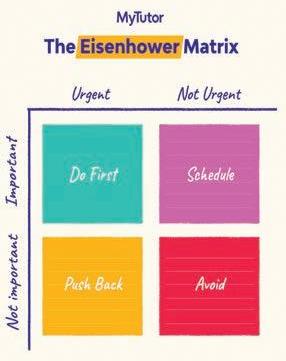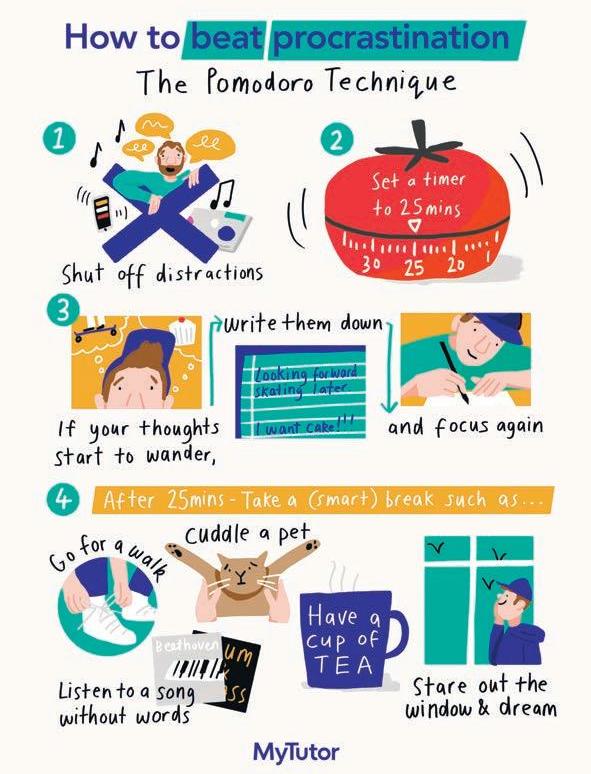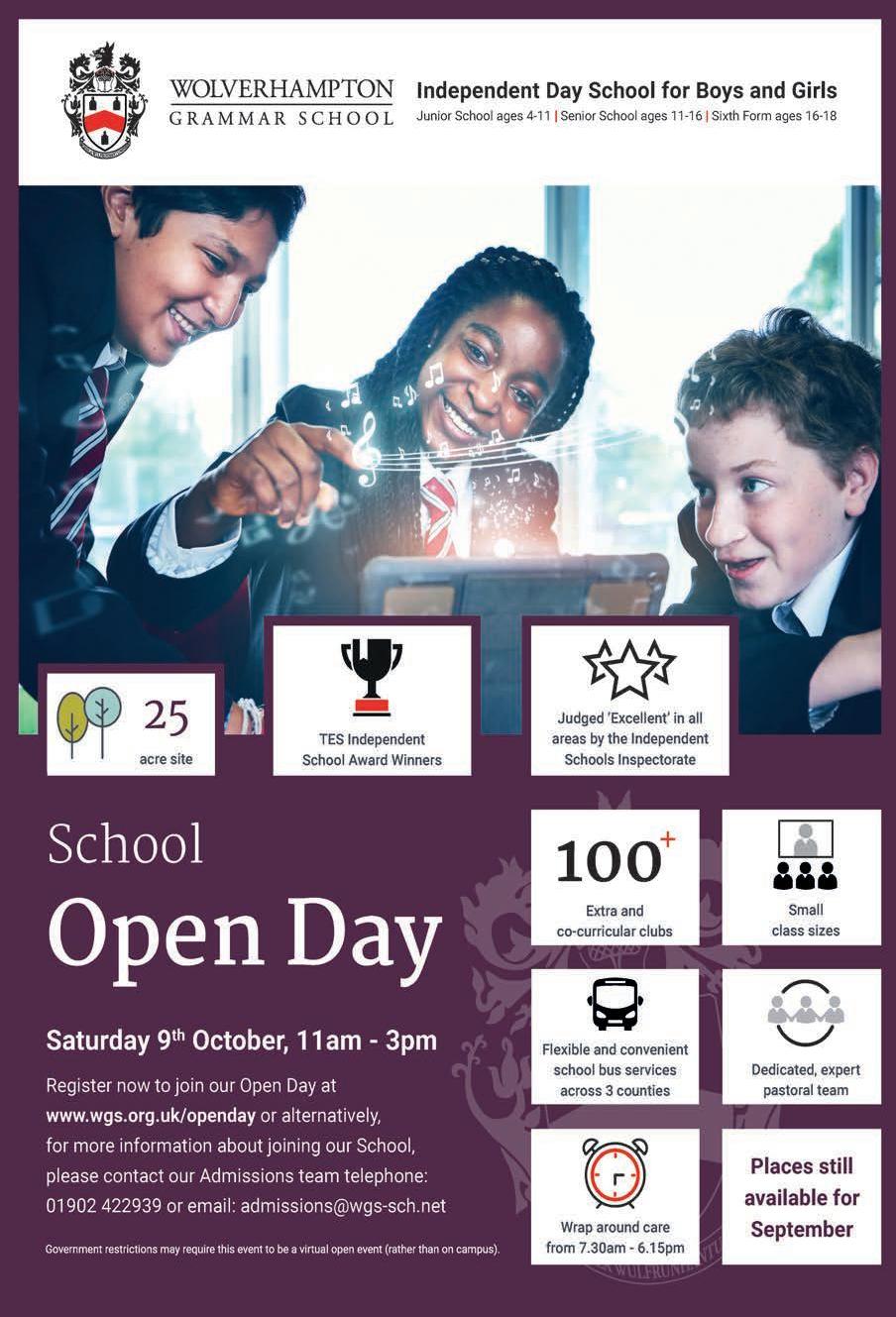
20 minute read
LOCAL NEWS

Marches Growth Hub helps
Advertisement
52,295 businesses, new figures show Economic grow...
The Marches Growth Hub – the one-stop home for business support and advice across Shropshire, Herefordshire and Telford – has helped more than 50,000 businesses achieve their ambitions, new figures show.
The hub has helped a total of 52,295 businesses with some form of support since it was established six years ago, the figures reveal. In that time, business advice experts have also helped 1,910 businesses to start up while the hub’s comprehensive website has attracted 103,986 unique visitors. Business support is delivered in partnership with Shropshire Council, Herefordshire Council and Telford & Wrekin Council. The figures have been released to mark ten years of the Marches Local Enterprise Partnership and its Decade of Delivery. The LEP oversees the Marches Growth Hub. Dave Courteen, the chair of the Marches Business Support Steering Group and Marches LEP small business champion, said the figures showed the huge impact the hub has had across the region. He said: “This is real help being delivered to real businesses day in, day out across the whole of the Marches region to ensure that our businesses are in the best possible shape to continue to grow and prosper. “The success of the hub since it was launched in 2015 has been exceptional. We have become the go-to place for all business support and advice and helped thousands of entrepreneurs and innovators realise their ambitions. “We have been able to do that through the unique way we work – in partnership with our public and private sectors alongside our skills and training providers and funding programmes, so that we can ensure we have all the information that businesses need right at our fingertips.” An example of the key role the Marches Growth Hub has played to help businesses sucseed include: Planet Doughnut:The Shrewsbury company has enjoyed a meteoric rise in just three years to become one of the region’s best-loved brands, employing 32 people at its Battlefield bakery and a further eight in its retail operations. Help from The Marches Growth Hub has seen it move to a new state-of-the-art bakery, access funding programmes and develop its business plan. Duncan McGregor, who founded the company with his wife Samantha, said: “The help and support we have had from the Marches Growth Hub Shropshire has been instrumental in our continued success. The hub has supported me literally from the get-go and has always been easy to contact and work with.” Other key figures revealed in the official report to the Department for Business, Energy and Industrial Strategy show that 52,851 people have received ‘light touch’ triage, information and/or signposting support from the hub, 408 businesses have been given ‘high intensity’ support and 688 have been referred to a funding programme. The hub also has bases in Hereford, Shrewsbury and Telford where its work is delivered in partnership with the local authority business support teams. Dave said: “Our satisfaction surveys showed an overwhelming number of businesses we come into contact with are satisfied with the support they receive. ” The hub has worked alongside other growth hubs across the West Midlands during the pandemic to ensure its help reached as many businesses as possible, and has also supported the recruitment of extra advisers in key sectors, Dave added.
The hub’s comprehensive website – www.marchesgrowthhub.co.uk –features links to advice programmes, workshops, events, funding information, regional and national assistance and an unrivalled database of business support.




World first aid Day

Taking place on the second Saturday of September annually, World First Aid Day falls on 11th September 2021, an annual campaign introduced in 2000 by the International Federation of Red Cross and Red Cross Crescent Societies (IFCR) to promote the importance of first aid training for the prevention of injuries and to help saving lives.


World First Aid Day looks to highlight the importance of basic first aid knowledge and believe this knowledge and information should be available to everyone. Receiving First Aid quickly in emergency can save lives in everyday and crisis situations, Cardiopulmonary resuscitation (CPR) is one of the lifesaving clinical aspects that can mean the difference between life and death, delayed CPR during a cardiac arrest often results in a poor outcome. For every minute without CPR, survival rates from cardiac arrest decreases by 7–10%. Choking is the fourth leading cause of unintentional death, choking causes suffocation and obstruction of the airwaves if not treated immediately. First Aid for choking uses a technique called the Heimlich manoeuvre; they are abdominal thrusts that lift your diaphragm and expel air from your lungs. If someone is choking and they have an obstruction in their airway the Heimlich Manoeuvre can expel the object causing the obstruction and therefore save the casualties life. Anaphylaxis is a severe allergic reaction that can occur after an insect sting or food allergy and is a medical emergency requiring immediate treatment. Reaction can occur very fast, often within seconds or minutes of coming into contact with the substance the person is allergic too. When anaphylactic shock happens, it may be difficult for the person to breathe, as their tongue and throat may swell causing obstruction to their airway. If you have received First Aid training you will have better knowledge of how to help the person before a 999 crew attends. Burns and scolding occur regularly within the domestic home. Burns and scolds can be very minor but in other circumstances burns can be life threatening and need emergency First Aid. If you need to give first aid for a burn or scold you’ll need to cool the burn as quickly as possible. Removing any clothing, being
THE THREE P’S mindful to not apply any creams, lotions or sprays to the area. Attending a first aid course will PRESERVE LIFE teach you how to treat many PREVENT FURTHER INJURY types of burns from chemical
PROMOTE RECOVERY burns to friction burns; with added knowledge in basic first aid training you can make a difference to the outcome before the person receives full medical treatment. First Aid training will give you an insight into various life saving techniques, each one valuable to cater for various different medical emergencies, for example heavy bleeding, Anaphylaxis and drowning. First Aid training will give you the confidence and skills to effectively respond with confidence. Keeping a first aid kit nearby within the home or to hand in your vehicle can be a great idea to ensure should you or somebody else require first aid you are equipped to respond. Get trained and ready to respond to an emergency.
For more information or to book your first aid course please visit
www.redcrossfirstaidtraining.co.uk or call 0344 871 8000


UK tutoring specialists reveal 3 top tips to catch up on study Ba to sl:
After a year of Zoom classes and disrupted studies, today's return to the classroom and the looming end-of-term assessments will be bringing a whole lot of pressure and anxiety to children who have fallen behind in their learning - and their parents too.

But with the right methods, it's possible to help your child get back on top of their learning in time for the end of term. To help with this, UK's No.1 online tutoring specialists MyTutor have compiled three tried-and-tested techniques to manage procrastination, prioritise tasks and tackle their most dreaded subjects head-on.
1. The Eisenhower Matrix (to decide what to do when)
A lengthy list of homework can be daunting for any child. This is a simple way to work out which tasks are urgent, which are important, and which can wait. All you need is to create a simple grid of four boxes on a sheet of paper, like this: Whatever falls into the urgent and important box should be done first –though the aim is to complete everything while it’s important but not (yet) urgent. Any items that are not urgent and not important, consider putting to one side. When the Eisenhower Matrix is used in business, urgent tasks that are not deemed important are usually “delegated” i.e. you get someone else to do it! Since you can’t get anyone to do your child's homework for them (sorry!), they probably won’t need to use this box for school revision, however it might be helpful to question whether something that falls into this box actually need to be done (and no, that doesn’t mean your child can put house chores or their least favourite subject in there!). This matrix can be a great tool to teach your child how to prioritise their various tasks while taking away some of the panic they might be feeling when they've got 20 things to study and don’t know where to start.
2. The Pomodoro Technique (to beat procrastination)
This one sounds a little fancy, but in fact “pomodoro” is simply Italian for tomato. It’s also a common shape for a kitchen timer! Neither of those things have anything to do with your child's study however - and you don’t need a tomato-shaped timer to try this technique (although a timer that’s not your phone is a good idea to help you shut off distractions). One of our favourite learning experts, Barbara Oakley, recommends this process as a way to bust procrastination and completely focus on any given task. Here’s a handy infographic that illustrates the process! The main goal of this technique is to shut off distractions and allocate specific periods of time for highly-focussed study, but an equally important aspect of this technique is teaching your child how to manage their wandering thoughts, as well as the importance of taking regular short breaks.

Try planning out 2-4 of these cycles over the course of a study day, or one in an afternoon.
3. Eat your frog (to do what you’re dreading)
Eat your what now? No, we haven’t gone crazy, and we don’t encourage cruelty to frogs! The eat your frog method is a way to bust procrastination, inspired by American writer Mark Twain’s quote, “Eat a live frog first thing in the morning and nothing worse will happen to you the rest of the day". Do you know that feeling when there's something you really don't want to do, and you end up procrastinating all day while it looms larger and larger in the back of your mind? It's likely your child knows the feeling too. This method is a great way to break free of that nasty cycle by facing the dreaded task (AKA their frog) first thing - either in the morning if they've got a day's revising ahead of them, or as soon as they home from school. It sounds a bit silly, but when your child faces the task they're dreading most first thing in the morning, it means they don't have to think about it again that day. "Teens need support now more than ever": Bertie Hubbard, co-founder of EdTech platform MyTutor, discusses the impact which the pandemic has had on the mental wellbeing of young people across the nation: “The last twelve months have been unbelievably tough year on teens and parents alike with months out of school, exam cancellations, not seeing friends and worrying about Covid-19. As schools open again, catching up on lost learning and prepping for assessed work this term will bring another set of challenges for teens. They’re in more need than ever for some support and reassurance with their studies, and that’s exactly what our tutors offer. Our tutors are all from UK universities, and because they’re just a few years older they can easily relate to what teens are going through. With their dedicated one-toone support, teens get some much-needed reassurance and come out with a stronger self-belief - 88% say that lessons made them feel more confident. Rather than replacing teachers with robots, the biggest power of EdTech lies in enhancing person-to-person learning. At MyTutor, we provide online tuition that raises kids’ grades, boosts confidence and helps them fulfil their potential in life. Because it’s online, kids get access to amazing tutors from across the country, rather than whoever’s nearby. As there’s no travel for the student or the tutors, it also saves time and money travelling - reducing the cost and stress involved for parents."

Ba to Sl
Those three little words that fill parents (and some kids) with joy.
Back to School with Exclusive, Eco-Friendly, Bold Stationery for All Students ...
It’s nearly that time of year, children and young people getting ready for their next year of learning, and parents making sure they have everything they need. What are the most vital parts of any student’s back to school kit? Paper stationery products are definitely one of the most essential, used daily to aid learning, whether it’s to scribble with crayon, jot notes, thoughts and ideas down, write their next masterpiece, plan their schedules, draft homework, list whatever they need or sketch away and get creative, paper is used every day for all manner of things. So what makes one notebook stand out from another?
Storigraphic has the answer with their wide range of exclusively designed, bright and inspiring series of notebooks and journals, which are also eco-friendly. Featuring a variety of bold cover designs unique to their collections to choose from, the options are diverse and there’s something for everyone, from the youngest pupil to the grown-up university student, to help inspire their creativity, growth and genius!
Available singly (starting from £4.50) or in bundles of three (from £9.60), there are A5 and A6 notebooks with lined or plain paper, and journals with 80 pages of dot, grid, lined and plain page layouts (£12). All of Storigraphic’s stationery and products are made in the UK, using FSC certified paper and responsibly sourced materials, always plastic-free as no lamination, so everything is recyclable, and sustainably produced. Explore the full range here: https://storigraphic.com/collections/stationery





Post-Pandemic Priories:
How to help your teen take back control of their future.
Second largest rise in unemployment was among people working in "professional, scientific and technical activities". With white-collar job security no longer guaranteed, what path will this generation's future workers take? MyTutor offers 7 tips to help parents help their teens take control of their futures
The UK's workforce looks considerably different to how it did a year ago. With 750,000 jobs lost, the pandemic has decimated job security across many sectors. Unfortunately there is no doubt that the hospitality and entertainment sectors have been some of the hardest hit, but data from LinkedIn suggests that now, some months after the first wave of job losses, the demand for white-collar workers is declining and causing a shortage in jobs for these professions. Whilst the job rate for workers in transport has risen by 18% with delivery drivers among the most popular new jobs, IT and software hires are down 9%, and the rate of new jobs in media is down by 17%. It seems office jobs are now lacking the job security they once had as the pandemic has called for a rise in blue-collar workers. The nation’s children are now more mindful than ever of their university and career prospects. Having witnessed periods of furlough or even unemployment in their parents and others around them, this has undoubtedly prompted students to rethink their long term university selection and career progression. New data from leading EdTech platform MyTutor has revealed that 18% of Brits have considered a job in the trades due the pandemic, so it's very possible that university applications this year will see a big decline as students prioritise skill based jobs and apprenticeships over higher education. The pandemic has created a volatile space for future workers but it's important to remember that whether or not teens are planning to go to university, they are in charge of their future. To help parents help teens plan their career paths, MyTutor has put some helpful tips together from their webinar with career education experts Mark Fox and Ryan Gibson. Please find the whole webinar here: https://www.youtube.com/watch?v=wYjGbFyNiNA&t=2423s
7 ways to help your teen plan their future
1. Encourage them to be proactive
The best way for a teen to find a career that suits them is if they work it out themselves. As a parent though, you can help a huge amount by asking the right questions and encouraging them to get thinking and looking. Ryan says that “asking a teen what they want to do in the future is like asking them to think of a colour that doesn’t exist”. In other words – you can’t know what you’ll enjoy if you don’t know what’s out there. If your teen doesn’t know
what they want to do, a good first step is seeing what jobs are out there and testing their gut reaction. To get started, the National Careers Service lists hundreds of jobs and tells you what they’re like and how you can get there.
2. Help them think about what they enjoy doing (and what they don’t)
Rather than trying to find a job to aim for and then working out the path to get there, starting with the skills and activities your teen enjoys can make it much easier to find what they’ll really love. As a parent, asking them what they enjoy the most at school, after school, on the weekends, and highlight particular skills that are involved in those roles can help them realise what they could be good at professionally. The Skills Builder website is a great free resource for helping teens with this.
3. Talk about it with them
Having an ongoing open conversation about their career planning is the best way to help them. Teens often don’t even realise what their strengths are, and telling them what you think they’re good at. Especially if they’re really unsure
4. Ask them what problems they see in the world
Rather than searching for a really specific role that they’d like to do in the future, ask your teen to have a think about what problems they see in the world and care about solving. This can help them connect their passions to groups of professions, and then can narrow down from there based on skills they have and ones they’d like to work on.
5. Listen to what they’ve got planned
One of the most helpful things you can do as a parent is really listen to what they’ve got planned – or what they’re not sure about. Instead of pushing them towards a particular path, you can help by encouraging them to develop an independent approach. Exploring their interests by talking about it with them, sharing resources and showing them different qualification types that are out there will set your teen on the best path to discovering the career path that’s right for them.
6. Direct them to resources available to them
As a parent, you don’t need to become a careers expert yourself. What you can do though, whatever your expertise, is push them in the direction of resources available to them: their school guidance teachers, online tutors and the big range of free online resources that are out there. For starters, have a look at the National Careers Service and the iCould website.
7. Help them evaluate opportunities
When looking at career opportunities – whether it’s work experience, apprenticeships, school subject choices, universities or even degrees – teens often don’t know how to weigh up their options. Here you can really help by asking probing questions to help them evaluate and work out what to go for. This can involve writing down with them the pros and cons of different options, including a bit of online research. For work experience, you can also help them look out for the things that will make an opportunity really valuable – will they get 1-1 support from people in the workplace? Will they be given the chance to learn about the company? By helping them research and make decisions through open discussions, you’re also setting them up well to work things out themselves in the future.

is closer than You ink...



Wolverhampton Grammar School is an extraordinary school. Founded in 1512, it's one of the oldest schools in the country, within easy access of the wider West Midlands, Staffordshire and Shropshire thanks to flexible school bus links. The independent day school has expanded its provision to incorporate Reception, Year 1 and Year 2. Wolverhampton Grammar School is a fully all-through school, providing the opportunity for children of all school ages (4-18) to join a truly unique community and experience its award-winning approach to education. Means-tested bursaries and scholarships are available for exceptional and deserving applicants to the Senior and Sixth Form. If you’ve never visited the stunning 25 acre campus, you can register at any time for an open event or personal tour. Simply visit www.wgs.org.uk/openday to register for events that are taking place across the coming months. First priority is the happiness of your child Children at Wolverhampton Grammar School receive pastoral care like nowhere else – that’s because happy children do well, thrive, and leave the school with excellent exam results and the confidence to embrace whatever opportunities come their way in their young adult lives. Your child will never feel alone at Wolverhampton Grammar School. Assistant Head in charge of Pastoral Care, Claudine Jones, leads a team of staff to support and work with families. Support includes a dedicated, expert pastoral team, school counsellor and annual adolescent mental health tracking using the latest digital tools. Academic excellence The staff are totally committed to providing the best teaching and learning experience for your child – something that continued in lockdown, thanks to high expertise in online delivery. Wolverhampton Grammar School offers a very wide range of subjects, from sciences to humanities, creative arts to languages. The timetable is built around the academic choices that the students make. They grow up to be confident, curious and independentminded, and their academic achievements speak for themselves. Despite the pressures of the pandemic, students were awarded stellar results at GCSE and A Level. Sixth Form students are also able to study towards Cambridge Technical and BTEC awards in a range of subjects. Sixth Form students achieved the highest number of A*- A grades for over 10 years, with 66% of entries receiving nothing but the top two grades. Alongside, 165 A* – B grades awarded (85% of all students). At GCSE, 641 Grade 9, 8 or 7 awards (equivalent to A* and A) – 79% of all grades were awarded. Students in Years 11 and 13 enjoyed another exceptional year with 100% pass rate. The School offers a tailored and individual approach to UCAS and Careers support and students can expect the very best preparation possible when it comes to life after school.
Interested to learn more?
Simply visit the website to register for an open event or to book an individual school tour,
www.wgs.org.uk/openday, alternatively please contact the Admissions team at Wolverhampton Grammar School telephone 01902 422939 email admissions@wgs-sch.net.
Pictured: Students celebrating their GCSE results in August.




Education Feature..............................
Like & Follow - Social Media...
INSTAGRAM: DEPublications12345 FACEBOOK: DEPublicationsLimited Twitter: @DEPublications





